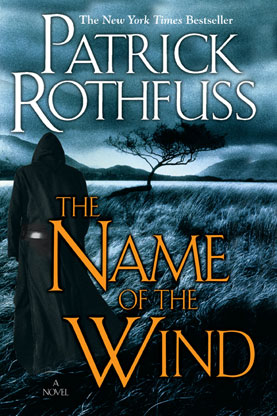For Isaac and Garrett.
1. Rothfuss tells this story mostly well. The story is interesting, with a satisfying number of things going on. Each chapter adds to some part of the narrative. There are various interesting characters and experiences. But some aspects feel like a foregone conclusion. For instance, the main character makes a few claims that things don’t work out like they do in a story—but they totally do here: Denna’s attraction to Kvothe surprises nobody except Kvothe; Kvothe’s slaying of the cow-beast thing works just like it has a hundred times before in books; everytime Kvothe is down to his last penny, some stroke of luck grants him reprieve from starvation. These lucky breaks annoy me a bit, as do his wry observations about storybook tales being constantly undermined. However, they manage to stay just this side of deus ex machina: the beast being killed accidentally and costing Kvothe much more than he anticipated, getting a whole silver talent as a beggar then getting it beat out of him, running into and losing Denna again and again. Rothfuss keeps the tale from relying too much on deus ex machina, but still manages to weave some surprise into the novel. This is done passably, but in all, the story is pretty good. I enjoyed it and it certainly kept me reading. It was exciting without a big body count, and that’s refreshing.
2. The structure of the story is pretty interesting. There are two timelines going on: the present-day and the past. In the present, the area Kvothe lives in is nebulous and torn apart by wars and weird creatures, while in the past the tale shows young Kvothe growing up. I assume that at the end of the third book, these two storylines will meet. But this allows Rothfuss to drop hints and foreshadow heavily. For instance, we know at one point that Kvothe will kill a king, get expelled from the University, and lose Denna irrevocably. But at this point, we don’t know why or how or when any of this will happen. This helps add to the way the book keeps me reading. The heavy foreshadowing shows this book for what it is: pulp fiction. But the structure is interesting and really works well.
3. Rothfuss even foreshadows that the tale is switching from present to past and staying there for a long time in the way Kvothe warns Devan that the tale will take three days to tell. This switch is a real risk for the author. It occurs around twenty percent into the book and it’s a major shift: basically restarting the book with new characters in a new place, changing the tone entirely, and not referring back to the present day world he’s already built explicitly. This is a real risky point where Rothfuss could’ve lost the reader easily, but he uses three pages to explain Devan’s appointment and Kvothe’s unwillingness to adhere to Devan’s time schedule. This explains to the reader what is coming. From there, the narrative is mostly in the past, with brief interludes into the present timeline. It’s well done.
4. Unfortunately, the writing is poor. Well, that’s not entirely fair. The writing is fine, but it’s pulp fiction writing. This novel won an award for Young Adult literature and Rothfuss’ vocabulary is limited, but not overly so. He even tries his hand at a few interesting tactics: specifically some nice repetition and some consonance. So it’s interesting for me to read as an adult. But I can also see my teenage boy self liking it more than I did.
5. One area where he steps away from traditional pulp fiction is in his characterizations. Nobody is perfect, nobody is wholly evil. The Fae are humanized by Bast, while Denna has a crooked nose. She is the love interest and, as such, Kvothe looks at her through rose-colored glasses, but Kvothe’s friends point out that she is cruel and has a crooked nose. She’s not perfect, and neither is Kvothe, and that’s a positive for the story. It somehow feels more honest, even with the storybook aspects Rothfuss has in there.
6. The theme seems to be some sort of call to find the silver lining in everything. I mean, this seems to be Rothfuss’ conclusion most of the time. Kvothe decides to be satisfied with how much time he gets to spend with Denna. He is satisfied with his paltry rainy day fund while homeless. At college he isn’t satisfied with being banned from the Archives, but he finds ways to work with it and doesn’t let it eat him apart. His whole family is murdered and he finds a healthy way to deal with it—it even teaches him about other people in a very important way. I guess this list shows that the theme is more about how to handle what life throws at you and turn all to your advantage, no matter how small that advantage. It’s about the importance of turning a negative into a positive, owning your faults in the sense of learning from them and when to allow them, and keeping a positive attitude.
7. I have some friends who consider this their favorite book, and I can see that. I know I have said some critical things so far, but it’s a cracking read and a good book: very exciting without being overly violent for the built world, and it kept me reading way past my bedtime. It has enough going on, enough threads to keep me reading. Being interested in the story and world from reading this book, I will be immediately reading the next one. This one is a good book.







No comments:
Post a Comment